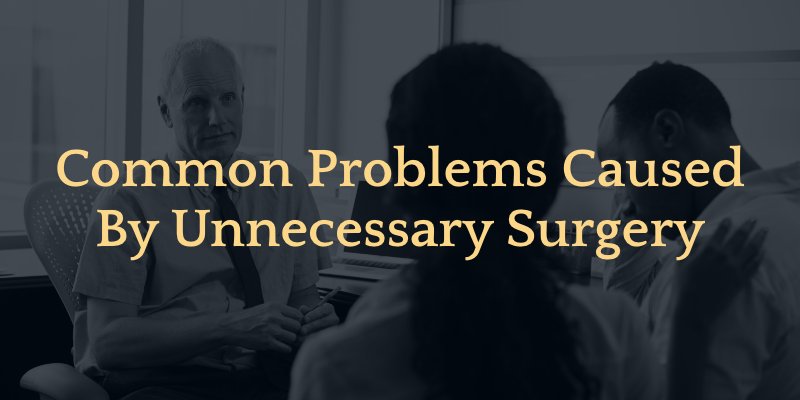No recovery • no fee
480.991.7677
scottsdale • phoenix
Common Problems Caused By Unnecessary Surgery
Published on February 5, 2024
Surgeries are lifesaving and can be critical in mitigating disease and treating injuries. As many as 50 million surgeries take place in the U.S. each year and 310 million occur globally. When surgery is necessary, it’s one of the most targeted and effective medical treatments available. However, surgery comes with significant risks, including postoperative infections and morbidity. A startling one to four percent of surgical patients die each year while as many as 15 percent suffer postoperative complications with five to 15 percent of post-surgical patients readmitted to the hospital within 30 days of their surgery. While these odds may be acceptable for necessary, life-saving surgeries, what if a patient undergoes surgery and faces the potential risks and complications only to learn that their surgery wasn’t necessary?
An estimated 7.5 million unnecessary surgeries occur each year, exposing patients to needless risks of complications.

What Are the Most Common Unnecessary Surgeries?
The American Medical Association (AMA) describes unnecessary surgery as any surgical procedure that’s not required, not specified, or not in the best interests of the patient when compared to non-surgical measures used to treat the same condition. According to the AMA, an estimated 12,000 people die each year due to unnecessary surgery.
Some types of surgeries are unnecessarily performed more often than others. The most commonly performed unnecessary surgeries include the following:
- Cesarean Sections
- Episiotomy
- Knee replacement
- Hip replacement
- Hysterectomy
- Spinal fusion
- Stent placement
- Back surgeries
- Tonsillectomies
- Angioplasty (heart stents)
- Pacemaker installation
- Gallbladder removal
Many of these common surgeries are performed on patients unnecessarily, when less invasive medical measures are available for treating the same conditions or when the risks outweigh the benefits for a particular patient.
What Problems Commonly Result From Unnecessary Surgeries?
When researchers ask surgeons the most likely reasons they perform unnecessary surgeries, the common answers were “because we were trained to do so,” “we’ve always done it this way,” and “for incentives like financial gain and renown.”
Post-operative infections, blood clots, organ damage, and anesthesia errors are the most common ill-effects of unnecessary surgery and among the deadliest. Other problems stemming from unnecessary surgeries are more specific to the surgery type, including the following examples:
C-Section Complications:
Cesarean sections increase the risks of infant breathing problems from transient tachypnea due to a lack of compression in the birth canal which helps babies to expel lung fluid during vaginal delivery. Other risks include accidental cuts to the infant or maternal organs, increased risk of hemorrhage and blood clots, risk of infection, and risks to further pregnancies.
Risks of Unnecessary Knee and Hip Replacements:
Knee and hip replacements increase the risk of chronic pain, additional surgeries, tissue damage, and pseudotumors due to metal particles and ions in the blood.
Hysterectomy Risks:
Studies show that hysterectomies are often performed on women when less invasive measures for common conditions are effective. Hysterectomies cause a risk of early menopause, bleeding, damage to the ureter, bladder, or bowel, vaginal problems, and ovarian failure.
Spinal Fusion and Other Back Surgeries:
Studies suggest that spinal fusion and other back surgeries are no more effective than physical therapy for treating common back conditions. Unnecessary back surgery causes risks of pain at the site of the bone graft, sexual dysfunction, broken or loose screws, additional surgery, and paralysis.
Angioplasty and Other Types of Stents:
Angioplasty and stent placement are meant as last resort options to open blocked arteries, but are often recommended unnecessarily, or when other treatments could be effective or delay the need for a stent. Problems associated with stents include blood clots, bleeding, artery damage, stroke, and kidney problems.
Episiotomy:
While episiotomies were once performed routinely in most childbirths, doctors now acknowledge they are not routinely necessary. Still, many doctors perform them to speed up the process of delivering a baby. Episiotomies may cause problems such as infections, painful intercourse, tearing between the perineum and anus, nerve damage, and rectal incontinence.
The Expense of Unnecessary Surgeries
Besides the physical impacts of unnecessary surgeries on patients, many also suffer significant financial consequences from unnecessary surgery including exorbitant hospital bills, expensive follow-up appointments and medications, and lost days or weeks of work. In some cases, taxpayers carry the burden of expense when Medicaid and Medicare pay for unnecessary surgery. Data shows that unnecessary surgery makes up about 30 percent of the nation’s medical costs, or about $750 billion annually. One study shows that about 10 percent of spinal fusion surgeries paid for by Medicare in a single year were unnecessary.
When Should You Get a Second Opinion?
A doctor should only suggest surgery if it’s essential to treat your condition, your quality of life is declining due to your medical condition, and there’s no viable alternative. If you have doubts about a surgery or other medical procedure your doctor recommends, it’s never rude to ask for time to seek a second opinion. A second opinion may be especially appropriate if your doctor is acting pushy or too aggressive with their recommendation for surgery. Getting a second opinion helps you to make a more informed choice about your all-important healthcare. Unless the surgery is for a life-threatening emergency, it’s always a good idea to seek a second opinion. In many cases, there is a less invasive alternative to surgery without the risk of surgical and post-surgical complications.
Is Unnecessary Surgery Medical Malpractice?
Though not every unnecessary surgery constitutes medical malpractice, if your doctor’s treatment didn’t uphold the standard of care accepted by the medical community for your condition it’s considered negligence. Negligent action by a doctor is medical malpractice when it results in injuries and damages such as a need for additional medical care and related expenses, lost income, and additional or prolonged pain and suffering.
Unnecessary surgery might also leave a doctor liable for your damages if they performed the surgery without obtaining informed consent. For instance, if your doctor failed to advise you of less invasive options for treating your condition or if they performed a surgical procedure that was outside of the scope of the procedure you gave your signed consent for.
If you had surgery due to a misdiagnosis, that is also grounds for a medical malpractice claim against the at-fault surgeon or medical facility where the surgery took place.
If you think you may have undergone unnecessary surgery and suffered damages, speak to a Phoenix surgical errors attorney about your options.
Let us tell your story
we care, and we can help. Contact us 480-991-7677 or fill out the form below
The personal injury attorneys in Phoenix, Arizona, at Knapp & Roberts have the compassion and trial lawyer skills to tell your story to a jury. We will get to know you and your family so that we can help the jury understand what has happened to you and your family and how it has changed your lives. Obtain the compensation necessary for the injuries and losses you have suffered.
Bob L. - "Mr. Knapp helped me with decisions I did not know how to deal with until he gave me excellent legal and medical consultation."

